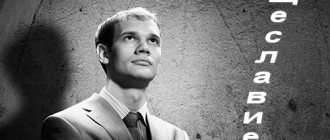What is the Human Soul and what is its essence is sought by many, both philosophers and scientists. But, the most preferable in this matter is esoteric knowledge, which differs from traditional methods of scientific research.
Every religion recognizes the existence of the Soul, however, each of them has its own concept of it.
People know a lot about the Soul and even gave it very specific characteristics: a person has a broad Soul or vice versa, it is weak or strong, it hurts and can be healed, you can touch it, or you can destroy it. She can die and be reborn. Among the people there is such a concept: “mysterious Russian Soul” or, for example, - he has a “kind Soul”, these concepts sometimes subconsciously escape from a person’s mouth.
Three Soul Powers
In the structure of the soul of St. The fathers distinguish three forces (abilities) - rational, irritable and concupiscible (mind, feelings and will).
The rational power of the soul (γνωστικον, rationale) is also called verbal, mental and cognitive. It is recognized as the dominant part of the soul. In its intact state, the rational force “reasons soundly and correctly distinguishes good from evil, and shows definitely and authoritatively to the desirable force which things it should be inclined to desire, which to love, and which to avert; the irritable force stands between the two of them, like a submissive slave, ready to diligently serve their desires” (St. Simeon the New Theologian).
The irritable power of the soul (παρασηλοτικον, irascile) is its feeling, emotional power. St. Basil the Great calls it the spiritual nerve, which imparts energy to the soul for striving in virtues. This part of the soul of St. Fathers attributes anger and a violent beginning. However, in this case, anger and rage do not mean passions, but jealousy (zeal, energy), which in its original state was zeal for good, and after the fall should be used as a courageous rejection of evil. “It is up to the irritable part of the soul to be angry with the devil,” say St. Fathers. The irritable force of the soul is also called the heart.
The appetitive part of the soul (επιθυμητικον, concupiscentiale) is also called desirable (desirable) or active. It allows the soul to strive for something or turn away from something. The concupiscible part of the soul includes the will, which tends to act.
“Train the irritable part of the soul with love, wither the desirable part with abstinence, inspire the rational part with prayer...” / Callistus and Ignatius Xanthopouls/.
All the powers of the soul are aspects of its single life. They are inseparable from each other and constantly interact. They achieve greatest unity when they submit to the spirit, focusing on contemplation and knowledge of God. In this knowledge, according to the word of St. Simeon the New Theologian, not a trace remains of their separation, they remain in unity like the unity of the Holy Trinity.
See also[ | ]
In related projects
- Meanings in Wiktionary
- Quotes on Wikiquote
- Texts on Wikisource
- Media files on Wikimedia Commons
- Soul mate
- Soulfulness
- World soul
- Spirit
- Animism
- Panpsychism
- "Phaedo" (Plato's dialogue)
- Jiva
- Atman
- Losing your soul
- Nature and essence of man
- Ego
- I (philosophy)
- Consciousness (psychology)
Human soul and body
The human soul is connected to the body. This connection is an unmerged connection. As a result of this connection, there are two natures in man - mental and physical, which, according to the word of St. Simeon the New Theologian, dissolved unmerged. From two natures, God formed one human being, in which “neither the body is transformed into the soul, nor the soul changes into flesh” (St. Simeon the New Theologian). Despite all this, such a union is unfused, but it is not indivisible and inseparable, since the human body acquired mortality and separation from the soul as a result of sin.
What is the basis of the Orthodox teaching about the two-part nature of man (soul and body)?
The Orthodox teaching about the two-part nature of man is based on direct evidence from Holy Scripture and Holy Tradition.
The account of the creation of man clearly states that Adam's body was created from the dust of the ground, and the soul was breathed into him by God (Gen. 2:7). In this context, the words of Ecclesiastes should also be understood, pointing to death as the separation of the soul from the body: “And the dust will return to the earth, as it was; and the spirit will return to God who gave it” (Eccl. 12:7).
In general, Holy Scripture repeatedly indicates that every person consists of a soul and a body, for example: “Therefore glorify God both in your body and in your soul, which are God’s” (1 Cor. 6:20); “Having therefore these promises, beloved, let us cleanse ourselves from all filthiness of the flesh and spirit, perfecting holiness in the fear of God” (2 Cor. 7:1).
The fact that the soul is not a product of the vital activity of the body (the central nervous system) is clearly communicated in the parable of the rich man and Lazarus, from which it convincingly follows that after separation from the body (that is, after the physical death of a person), the soul continues to live, and, moreover, to live conscious life. Thus, the soul of a rich man, while in hell, recognizes the souls of Abraham and Lazarus (the latter are in a special area - Abraham’s bosom) (Luke 16:23), carries on a conversation with the soul of Abraham (Luke 16:24-26), feels torment and experiences a conscious desire to alleviate his torment (Luke 16:24), strives to show concern for his brothers living earthly life (Luke 16:27-31).
Associated with the belief in the afterlife of souls is the practice of prayerful remembrance of the departed, as well as the practice of prayerful communication between believers and saints who have died in the Lord. Thus, the denial of the substantial soul in man is the grossest opposition against Orthodoxy, against the Church.
***
Content
- 1 History of the development of the concept
- 2 The concept of soul in philosophy 2.1 Ancient tradition. Pre-Socratics, Plato and Aristotle
- 2.2 Democritus
- 2.3 Stoics and Epicureans
- 2.4 Middle Ages
- 2.5 New time
- 3.1 Judaism 3.1.1 Second Temple era
- 3.2.1 The question of the pre-existence of the soul
- 4.1 Ancient Egypt
Soul concept
The soul is a certain special force present in a person, which constitutes the highest part of him; it revives a person, gives him the ability to think, sympathize, and feel. The words “soul” and “breathe” have a common origin. The soul is created by the breath of God, and it has indestructibility. It cannot be said that it is immortal, because only God is immortal by nature, but our soul is indestructible - in the sense that it does not lose its consciousness, does not disappear after death. However, it has its own “death” - this is the ignorance of God. And for that matter, she may die. That is why the Scripture says: “The soul that sins shall die” (Ezek. 18:20).
The soul is a living essence, simple and incorporeal, by its nature invisible to bodily eyes, rational and thinking. Having no form, using an endowed organ - the body, providing it with life and growth, feeling and generating power. Having a mind, but not different from herself, but as the purest part of her - for as the eye is in the body, so is the mind in the soul. She is autocratic and capable of willing and acting, changeable, i.e. voluntarily changing because it was created. Having received all this by nature from the grace of the One who created her, from whom she received her being.
Some sectarians, such as Jehovah's Witnesses and Seventh-day Adventists, reject the immortality of the soul, considering it simply a part of the body. And at the same time they falsely refer to the Bible, to the text of Ecclesiastes, which poses the question of whether the human soul is similar to the soul of animals: “Because the fate of the sons of men and the fate of animals is one fate: as they die, so these die, and one everyone has breath, and man has no advantage over cattle, because everything is vanity!” (Eccl. 3:19). Then Ecclesiastes himself answers this question, which the sectarians neglect, he says: “And the dust will return to the earth, as it was; and the spirit returned to God, who gave it” (Eccl. 12:7). And here we understand that the soul is indestructible, but it can also die.
Soul in Arab-Muslim thought
D. (Arabic - nafs), also meaning “self”, “I”, was often identified with spirit (rukh). According to the Koran (15:29, 38:72) and the Sunnah, God, having created the first man - Adam, breathed D. into him; Adam's descendants receive it in the womb through a special angel. Separated from the body after death, D. will be reunited with it on the Day of Judgment. For rationalists. theology (kalama) is characterized by the idea of \u200b\u200bD. as something occurring in the body and, therefore, mortal; Ibn Qayyim al-Jawziyya (d. 1350) in his “Book of the Soul” (“Kitab ar-rukh”) cited 116 proofs of the material nature of death. The doctrine of immateriality, substantiality and immortality of death was defended primarily by Aristotelian philosophers (falsafa), whose views were far from mainstream Muslims. theology of ideas; Immortality was understood in different ways. If Ibn Sina considered any kind of death to be immortal, then al-Farabi considered only “enlightened” souls who realized their potential mind, and Ibn Rushd asserted only the immortality of a single mind, common to all people. From the point of view of philosophers and many others. representatives of Sufism (Ibn al-Arabi and his school), the Day of Judgment for each person occurs immediately after his death, and resurrection means the return of only D. (but not the body) to the divine world; An idea of world life, akin to Neoplatonism, also developed. The highest part of human life was called “spirit” by the Sufis. The doctrine of the transmigration of souls found supporters among some sects, especially the Shiites.
About occult technologies related to the control of the human body
If we turn to the patristic heritage, we will see that there are usually three main forces in the soul: mind, will and feelings, which manifest themselves in different abilities - thinking, desire and concupiscence. But at the same time, we must understand that the soul also has other powers. All of them are divided into reasonable and unreasonable. The irrational principle of the soul consists of two parts: one is disobediently reasonable (does not obey reason), the other is obediently reasonable (obeys reason). The highest forces of the soul include the mind, will and feelings, and the unreasonable forces include the vital forces: the force of the heartbeat, seminal, growth (which forms the body), etc. The action of the soul's power animates the body. God deliberately made sure that the vital forces were not subject to the mind, so that the human mind would not be distracted by controlling the heartbeat, breathing, etc. There are various technologies related to the control of the human body that try to influence this life force. What yogis do intensely: they try to control the heartbeat, change breathing, control the internal processes of digestion and are terribly proud of it. In fact, there is absolutely nothing to be proud of here: God deliberately freed us from this task, and it is stupid to do this.
Imagine that, in addition to your regular work, you will be forced to do the work of the housing office: organize garbage collection, cover the roof, control the supply of gas, electricity, etc. Now many people are delighted with all sorts of occult, esoteric arts; they are proud that, to some extent, they have mastered the regulation of this vital force of the soul, which is beyond the control of reason. In fact, they are proud of the fact that they exchanged their job as a university teacher for a job as a sewer operator. This is due to the stupid idea that the mind can handle the body better than the irrational part of the soul. I will answer that in fact it will do worse. It has long been known: any attempts to rationally build life lead to very irrational consequences. If we try to use the power of our mind to properly control our body, the result will be complete stupidity.
Why did Anthony the Great say that a monk must take a blessing even for the number of drops of water he drinks? In order to free the monk's mind as much as possible from the worries of life. The task of obedience is the exact opposite of yoga. If a yogi or occultist tries to control his body with the help of his mind, then an Orthodox monk completely frees his mind from caring about the body in order to switch it entirely to God.
priest Daniil Sysoev
***
About the soul of the God-man Jesus Christ
By human nature, Christ had body and soul. Since the human and Divine natures are united in the Person (Personality) of the Son of God, it can be argued that the soul of Christ is the soul of the incarnate Son of God.
“Christ, in order to bring us to God, once suffered for our sins, the righteous for the unjust, being put to death in the flesh, but made alive in the Spirit, by which He went and preached to the spirits in prison” (1 Peter 3:18-19).
From the Easter Hours: “In the tomb carnally, in hell with the soul like God, in paradise with the thief, and on the Throne you were, Christ, with the Father and the Spirit, fulfilling everything, indescribable.”
***
Scientists' opinion
For the most part, scientists remain skeptical about the reality of the soul. However, enthusiasts from the world of science never cease to amaze.
Pavel Guskov from Barnaul conducted an experiment with water, trying to prove that each person’s soul is as individual and capable of leaving imprints like fingertips. Five people were invited, placing a glass of water next to each for 10 minutes. After this, Guskov analyzed the samples for changes in structure. Surprisingly, it turned out that the water of each of the experiment participants acquired new properties that were different from the rest of the focus group samples.
Psychics believe that material confirmation of the reality of the soul is just a matter of time.
Are there restless souls who are forced to wander the earth, finding no peace?
The Holy Church believes “that the souls of the dead are in a state of rest or torment, according to their deeds. Having separated from their bodies, they immediately (!) move either to joy or to sadness and crying; however, it is generally accepted that neither their blessedness nor their condemnation are perfect” (Episode of the Eastern Patriarchs, part 18). The abode of the righteous is heaven, the sinners are in hell (see Right Confession, Part 1, Issues 67, 68) or, according to the words of Job, the land of “eternal darkness, where there is no light and it is impossible to see human life” (Job 10 :22).
On this occasion, the ecumenical teacher St. John Chrysostom spoke well: “It is no longer possible for the soul, separated from the body, to wander here, because “the souls of the righteous are in the hand of God” (Wis. Sol. 3:1) <...> And the souls of sinners immediately are removed from here. This is clear from the parable of Lazarus and the rich man. And in another place Christ says: “Today your life will be taken from you” (Luke 12:20). And it cannot be that the soul that left the body wandered here. And this is quite consistent with reason. <…> And that the souls of sinners cannot remain here after death, listen to the rich man who asked for a lot and did not receive what he wanted. If this had been possible, he himself would have come and announced what was happening there. From this it is clear that souls, after leaving here, are taken to a certain country and, no longer able to return from there, await that terrible day” (Conversations on the Gospel of Matthew, 28).
The saint explains the cases of visions of wandering spirits by demonic action: “The demon tries to show that she not only lives in the bones (of dead people), but walks here and there, wandering in vain, that she is not subordinate to any authority, not even to Divine providence, and will not be subject to any punishment for the crimes committed. Thus, he does what many believe that after death souls constantly wander. But these are fables of children and old women, and beware of believing them when you are attracted by such fictions” (Commentary on the Prophet Isaiah, chapter 8).
At the same time, history knows many cases of the appearance of the souls of the dead alive. Since “the continuation of the existence of the soul after its separation from the body and its immortality is an undoubted truth, since the Savior himself established it against the Sadducees who did not recognize it, then, for this reason alone, the return of departed souls and their appearance to people living on earth, by the permission or command of God , are quite possible and do not represent anything incredible. Among the Jews contemporary with the Savior, faith in this return and this phenomenon was a universal faith. Jesus Christ assumed it as undoubted, and never said anything from which one could conclude that he did not approve or condemn this faith. <…> The souls of the departed, of course, appear and can appear on earth not of their own will, but only by the command and permission of God. God commands and allows them to appear only for some special purposes worthy of Him. If they could appear of their own accord, then their appearances would, of course, be much more frequent than they actually are; in this case, of course, there would be few among them who would not come to earth for various personal reasons, out of motivation, for example, a feeling of kinship and a desire to meet with their loved ones, etc. This opinion is expressed by Blessed Augustine, speaking about his mother, St. Monica, who loved him so dearly. The evangelical rich man would certainly have visited his brothers and relatives to inform them of the unfortunate fate that befell him in the afterlife. But God, in His mercy and omnipotence, allows the souls of the departed to appear only very rarely. Therefore, everything that is said and written about the apparitions of the deceased should be treated with great caution and prudence” (Arch. Grigory Dyachenko. The Secret Life of the Soul after Physical Death. M., 2010. P. 93, 97).











